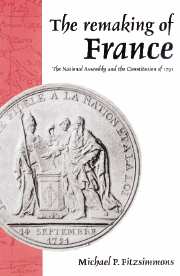Book contents
- Frontmatter
- Contents
- Preface
- List of abbreviations
- Part one
- 1 The crisis of the Old Regime
- 2 The formation of the new ideal of the polity
- 3 The achievement of the new ideal of the polity
- 4 The new ideal of the polity reaffirmed
- Part two
- Conclusion
- Appendix
- Bibliographical note and list of manuscript sources
- Index
2 - The formation of the new ideal of the polity
Published online by Cambridge University Press: 14 October 2009
- Frontmatter
- Contents
- Preface
- List of abbreviations
- Part one
- 1 The crisis of the Old Regime
- 2 The formation of the new ideal of the polity
- 3 The achievement of the new ideal of the polity
- 4 The new ideal of the polity reaffirmed
- Part two
- Conclusion
- Appendix
- Bibliographical note and list of manuscript sources
- Index
Summary
Despite these follies, it seems to me that the plurality will be for … moderation, but I do not doubt that before the end of the month the Third will resolve to declare that it is the nation, that it alone is the nation.
Diary of the deputy Adrien Duquesnoy, May 15, 1789On May 4,1789, amidst high hopes and expectations among the deputies and in the nation at large, the Estates-General opened at Versailles. The opening ceremony, with an emphasis on the distinction of orders that denigrated the Third Estate, annoyed several Third Estate deputies. The more substantive aspect of the problem of the distinction of orders appeared soon afterward, however, and the impasse that developed in the opening days of the Estates-General quickly established privilege – specifically privilege as embodied in the procedures of 1614 – as the primary obstacle to be overcome before the task of national regeneration could be realized.
Having agreed to consider yielding their pecuniary privileges, the nobility believed that nothing more should be asked of them and attempted to maintain deliberation by orders. The day after the opening ceremonies, the clergy and the nobility withdrew to their respective chambers, while the Third Estate reassembled in the common meeting room to await the other two orders.
- Type
- Chapter
- Information
- The Remaking of FranceThe National Assembly and the Constitution of 1791, pp. 33 - 68Publisher: Cambridge University PressPrint publication year: 1994



